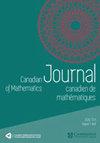关于伪有限半群的极小理想
IF 0.7
3区 数学
Q3 MATHEMATICS
Canadian Journal of Mathematics-Journal Canadien De Mathematiques
Pub Date : 2022-04-21
DOI:10.4153/S0008414X2200061X
引用次数: 1
摘要
摘要:如果一个有限集$U\subseteq S\times S$能生成普遍的右同余,则称半群S是右伪有限的,并且任意对$(s,t)\in S\times S$的导数长度有一个界作为u中的导数的结果。本文探讨了右伪有限半群中极小理想的存在性和性质。继续danan等人在早期工作中开始的主题,我们证明了在几个自然类的一元群中,右伪有限意味着存在一个完全简单的极小理想。这是正统一元群、完全正则一元群和右可逆一元群的情况,它们包括所有交换一元群。我们还证明了某些其他条件意味着最小理想的存在,而最小理想不一定是完全简单的;值得注意的是,这是半群的情况,其中Green的预定顺序${\leq _{\mathcal {L}}}$或${\leq _{\mathcal {J}}}$与乘法保持兼容。最后,我们建立了一些没有极小理想的拟有限单群的例子。我们开发了一种显式结构,产生具有额外所需属性的示例,例如,规律性或${\mathcal {J}}$ -琐碎性。本文章由计算机程序翻译,如有差异,请以英文原文为准。
On minimal ideals in pseudo-finite semigroups
Abstract A semigroup S is said to be right pseudo-finite if the universal right congruence can be generated by a finite set
$U\subseteq S\times S$
, and there is a bound on the length of derivations for an arbitrary pair
$(s,t)\in S\times S$
as a consequence of those in U. This article explores the existence and nature of a minimal ideal in a right pseudo-finite semigroup. Continuing the theme started in an earlier work by Dandan et al., we show that in several natural classes of monoids, right pseudo-finiteness implies the existence of a completely simple minimal ideal. This is the case for orthodox monoids, completely regular monoids, and right reversible monoids, which include all commutative monoids. We also show that certain other conditions imply the existence of a minimal ideal, which need not be completely simple; notably, this is the case for semigroups in which one of the Green’s preorders
${\leq _{\mathcal {L}}}$
or
${\leq _{\mathcal {J}}}$
is left compatible with multiplication. Finally, we establish a number of examples of pseudo-finite monoids without a minimal ideal. We develop an explicit construction that yields such examples with additional desired properties, for instance, regularity or
${\mathcal {J}}$
-triviality.
求助全文
通过发布文献求助,成功后即可免费获取论文全文。
去求助
来源期刊
CiteScore
1.80
自引率
0.00%
发文量
58
审稿时长
4.5 months
期刊介绍:
The Canadian Journal of Mathematics (CJM) publishes original, high-quality research papers in all branches of mathematics. The Journal is a flagship publication of the Canadian Mathematical Society and has been published continuously since 1949. New research papers are published continuously online and collated into print issues six times each year.
To be submitted to the Journal, papers should be at least 18 pages long and may be written in English or in French. Shorter papers should be submitted to the Canadian Mathematical Bulletin.
Le Journal canadien de mathématiques (JCM) publie des articles de recherche innovants de grande qualité dans toutes les branches des mathématiques. Publication phare de la Société mathématique du Canada, il est publié en continu depuis 1949. En ligne, la revue propose constamment de nouveaux articles de recherche, puis les réunit dans des numéros imprimés six fois par année.
Les textes présentés au JCM doivent compter au moins 18 pages et être rédigés en anglais ou en français. C’est le Bulletin canadien de mathématiques qui reçoit les articles plus courts.

 求助内容:
求助内容: 应助结果提醒方式:
应助结果提醒方式:


